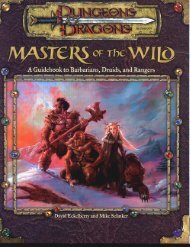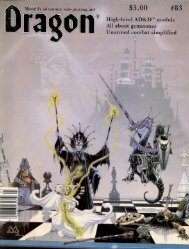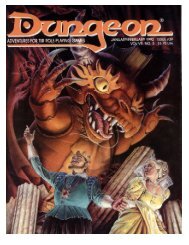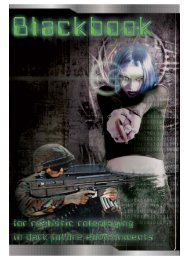Accessory - Dragon Magazine #111.pdf - Index of
Accessory - Dragon Magazine #111.pdf - Index of
Accessory - Dragon Magazine #111.pdf - Index of
Create successful ePaper yourself
Turn your PDF publications into a flip-book with our unique Google optimized e-Paper software.
and other organizations, and by Cyclops’s<br />
telepathic awareness that he gained from<br />
close contact with Jean Grey.<br />
Class 1000 adventures<br />
If her existence could be hidden from the<br />
interstellar empires and Earth’s heroes at<br />
large, Phoenix might find adventure interacting<br />
with other equally powerful beings<br />
— among them Molecule Man, Odin,<br />
Zeus, the Celestials, Death, Eternity,<br />
the In-Betweener, Korvac, Mephisto,<br />
the Elders <strong>of</strong> the Universe, Ego,<br />
Thanos, and Galactus. Note that several<br />
<strong>of</strong> these beings are supposed to be dead —<br />
but this, <strong>of</strong> course, could be altered.<br />
The MARVEL SUPER HEROES game<br />
begins to lose its balance as a character’s<br />
abilities enter the Class 1000 level, but<br />
with the proper restrictions even the<br />
mightiest characters can be played. In the<br />
case <strong>of</strong> Phoenix, most <strong>of</strong> her powers are<br />
balanced by the danger <strong>of</strong> turning into<br />
Dark Phoenix (and being turned into an<br />
NPC run by the Judge). The player who<br />
uses Phoenix should be finely aware <strong>of</strong> the<br />
responsibility that comes with endless<br />
power; indeed, Phoenix herself was in the<br />
habit <strong>of</strong> applying an upper limit to her<br />
power use (assumed here to be on the<br />
Unearthly level).<br />
It is conceivable that a group <strong>of</strong> players<br />
may wish to use several Class 1000 heroes<br />
on an adventure. Imagine trying to come<br />
up with a scenario to challenge Phoenix,<br />
Molecule Man, Galactus, and Zeus! It can<br />
be done, however (though it will take a<br />
little time). Note, for example, that several<br />
<strong>of</strong> the Class 1000 beings above are (or<br />
were) villains. Some, like the Celestials,<br />
seem to surpass all but the Beyonder in<br />
power. A Class 1000 being can be challenged<br />
by a fleet <strong>of</strong> starships, an invasion<br />
<strong>of</strong> Unearthly-class demons from Mephisto,<br />
a reanimated suit <strong>of</strong> Destroyer armor,<br />
and so forth. Masses <strong>of</strong> low-level sorts can<br />
be as effective as tougher ones (just as a<br />
swarm <strong>of</strong> wasps can be as bad as a single<br />
wolf).<br />
Then, too, one must consider the personality<br />
<strong>of</strong> the characters involved.<br />
Phoenix is an adventurer at heart, true<br />
enough — but Molecule Man wants to be<br />
left alone to live with his girlfriend<br />
Volcana, Zeus usually has governmental<br />
matters on his mind, and Galactus is basically<br />
interested in raiding the stellar icebox<br />
all day to feed his hunger. It might be<br />
better to arrange for adventures in which<br />
Phoenix is played with an assortment <strong>of</strong><br />
Unearthly-class heroes, such as Hercules,<br />
Thor, and the rest — but then you run into<br />
the old problem <strong>of</strong> convincing the good<br />
guys that Phoenix is a good guy, too. The<br />
chances <strong>of</strong> that happening might be very,<br />
very slim. Perhaps the easy-going Molecule<br />
Man (who tutored the Beyonder, after all)<br />
would help out, and the Silver Surfer<br />
would be a good bet to befriend her.<br />
Beyond that . . . ?<br />
When designing ultra-tough adventures<br />
for Unearthly-class characters (and above),<br />
the following points should be kept in<br />
mind:<br />
1. Avoid always threatening the existence<br />
<strong>of</strong> the Earth or the universe. Secret<br />
Wars II did a nice job <strong>of</strong> threatening everything<br />
there was, and saving the Earth<br />
becomes an old theme after a time. But<br />
outer space is full <strong>of</strong> places that could<br />
challenge the abilities <strong>of</strong> any hero or<br />
villain. Aliens could come to Earth and<br />
request aid to save their people from<br />
extinction or conquest. A mammoth starship<br />
could enter the solar system on an<br />
unknown mission. An alien life-force could<br />
have invaded Galactus’s world-ship and<br />
placed him in suspended animation, and<br />
his Herald Nova might need help in<br />
removing it. Then, there is always the<br />
Secret Wars I model (kidnapped heroes<br />
fight kidnapped villains in cosmic arena).<br />
This can be overdone, <strong>of</strong> course, though<br />
the Grandmaster, the Collector, and<br />
Kang seem to enjoy this.<br />
2. Use a wide assortment <strong>of</strong> foes. If highstrength<br />
heroes fight only other highstrength<br />
heroes, the Judge will see yawns<br />
from the players before long. Use variety<br />
when choosing villains: magic-using foes,<br />
mentalist foes, multipowered enemies, etc.<br />
If a hero has a weak spot, hit it now and<br />
then (though this could prove fatal to<br />
everyone in Phoenix’s case; use good<br />
judgement here).<br />
3. Vary the damage done by attacks. The<br />
reason for this becomes obvious when an<br />
Unearthly-class attack is pitted against<br />
Unearthly armor, or any other such situation.<br />
It stands to reason that some damage<br />
must get through sometime. One solution<br />
to this is to vary damage done by attacks,<br />
while keeping armor values constant. One<br />
table that varies attack damage within a<br />
range <strong>of</strong> 20% higher or lower appears<br />
below. Damage values below Good are too<br />
low to bother with; those at Class 1000<br />
level are too high.<br />
Attack Base Variable<br />
power rating rating<br />
Good 10 2d4 + 5<br />
Excellent 20 2d4 + 15<br />
Remarkable 30 2d6 + 23<br />
Incredible 40 2d8 + 31<br />
Amazing 50 2d10 + 39<br />
Monstrous 75 3d10 + 59<br />
Unearthly 100 2d20 + 79<br />
Shift X 150 3d20 + 119<br />
4. Spell out a powerful character’s<br />
powers as completely as possible, and<br />
allow only one character per player. If the<br />
characters powers are specific (as well as<br />
its limitations), then the player will have a<br />
clearer idea <strong>of</strong> what sorts <strong>of</strong> things he or<br />
she can try, and the player will have his<br />
hands full anyway figuring out what to do<br />
next.<br />
5. Use mystery and problem-solving in<br />
addition to straightforward punch-‘em-out<br />
fights. If Phoenix cannot hit a foe with a<br />
force-bolt, maybe she could talk him out <strong>of</strong><br />
his crime — or even apply a gentle,<br />
friendly threat that harms no one. Problem-solving<br />
adventures, involving careful<br />
planning, strategy, and creative thought,<br />
are always good ways to keep even<br />
Phoenix and Molecule Man busy.<br />
6. Finally, apply limitations to Class 1000<br />
abilities that could threaten game balance.<br />
Phoenix, as given above, can reach Class<br />
1000 power in almost any area — but<br />
doing so is very risky for her, and she<br />
should set her limits lower than that.<br />
Applying fixed limits beyond which certain<br />
penalties come into play is a good<br />
method <strong>of</strong> controlling the character’s<br />
actions, and on-the-spot judgements on<br />
Karma losses and so forth are also helpful.<br />
Any Karma loss should be considerable for<br />
powerful characters, particularly since the<br />
PCs have a greater responsibility to check<br />
their powers. Acting out <strong>of</strong> character may<br />
also cause a substantial Karma loss (100<br />
points minimum). Another limitation for<br />
any Class 1000 character is to prohibit the<br />
use <strong>of</strong> Karma pools; otherwise, game<br />
balance takes a walk.<br />
The NPC Phoenix<br />
Much <strong>of</strong> the above information should be<br />
useful in figuring out adventures for an<br />
NPC Phoenix controlled by the Judge —<br />
which in the long run might be the best<br />
way to handle her in most campaigns.<br />
Phoenix (even at the somewhat scaleddown<br />
levels above) may prove too overwhelming<br />
to use, though it could prove to<br />
be interesting in the sorts <strong>of</strong> player-toplayer<br />
interaction it produces.<br />
Should Phoenix ever turn to Dark<br />
Phoenix, the Judge should play her to be<br />
as savage, vicious, vindictive, ruthless, and<br />
destructive as possible. If you don’t want<br />
to kill heroes, be sure to scare them!<br />
Undoubtedly, this might be a good time to<br />
trot out Molecule Man to clean up after<br />
her, and a contest <strong>of</strong> wills between the two<br />
would be an interesting problem. Perhaps<br />
the players could take the roles <strong>of</strong> several<br />
Class 1000 beings who are trying to hunt<br />
down Phoenix and destroy her, if the<br />
Judge feels up to it. Otherwise, the players<br />
will be concerned with staying out <strong>of</strong> the<br />
way as Phoenix mixes it up with the other<br />
Class 1000 types.<br />
Finally, a series <strong>of</strong> scenarios could be<br />
played out in which an NPC Phoenix<br />
returns and the heroes have to decide<br />
how to handle her. Since she might not<br />
initially be in Dark Phoenix form, it would<br />
be wise to handle her carefully (as with<br />
the Beyonder). In time, she might be convinced<br />
to leave for parts unknown, rejoin<br />
the phoenix-force, or turn fully human<br />
(and become completely normal). The<br />
possibilities are endless.<br />
D RAGON 81







